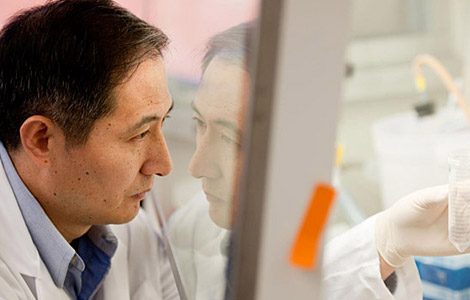|
|||||||||||
BEIJING - About 105 people were diagnosed with cancer every day in the capital last year, with the disease responsible for one in four deaths, a recent study shows.
The figures were released by the Beijing Institute for Cancer Research on Tuesday during a news conference to mark the 35th anniversary of the Peking University Cancer Hospital, a partner organization.
Lung and breast cancer are the major threats, said Li Pingping, co-author of the report, which was based on Beijing Health Bureau data collected between 1995 and 2010.
Research found that, between 2000 and 2009, instances of lung cancer rose 56 percent, while breast cancer cases went up 127 percent.
Less common cancers such as thyroid cancer and uterine body cancer have also seen rapid increases over the past decade, the report added.
"Pollution and unhealthy lifestyles are the primary causes for the high cancer rate," Li said, adding that the fast pace of life in the city, as well as excessive pressure, disrupt people's hormones and increases the cancer risk.
Li said people can reduce the threat by stopping smoking, doing more exercise and shedding excessive weight.
"Scientific data show as many as 65 percent of cancer cases can be cured if patients are diagnosed early enough," said Ji Jiafu, president of Peking University Cancer Hospital. "However, as most patients don't know about their disease until later, their cancer has time to develop.
"We should raise public awareness about prevention and change a situation in which only terminal-stage patients are the ones going to hospitals for treatment," he said.
To help tackle the problem among one high-risk group, Ji's hospital will provide free cancer screening services to 2,000 bus drivers, taxi drivers and railway workers in Beijing over the next five years.
"Most public transport employees work long hours, get insufficient sleep and eat irregular meals, so they're often in a state of poor health," said Guo Jun, vice-president of the hospital.
"Regular physical checks may help people detect cardiovascular disease, but there's no chance of finding cancer cells without special tests," he said.
In addition to targeting public transport workers, the hospital also plans to send staff members into communities to promote cancer prevention awareness.
Hot Topics
Libya conflict, Gaddafi, Oil spill, Palace Museum scandal, Inflation, Japan's new PM, Trapped miners, Mooncake tax, Weekly photos, Hurricane Irene
Editor's Picks

|

|

|

|

|

|







